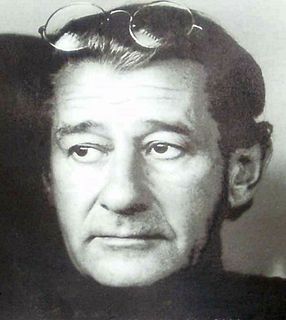A Quote by Gerard Manley Hopkins
I consider my selfbeing ... that taste of myself, of I and me above and in all things, which is more distinctive than the taste of ale or alum, more distinctive than the smell of walnutleaf or camphor, and is incommunicable by any means to another man.
Related Quotes
It is self-evident that St. Louis affected me more deeply than any other environment has ever done. I feel that there is something in having passed one's childhood beside the big river, which is incommunicable to those people who have not. I consider myself fortunate to have been born here, rather than in Boston, or New York, or London.
A good taste in art feels the presence or the absence of merit; a just taste discriminates the degree--the poco piu and the poco meno. A good taste rejects faults; a just taste selects excellences. A good taste is often unconscious; a just taste is always conscious. A good taste may be lowered or spoilt; a just taste can only go on refining more and more.
Judges of elegance and taste consider themselves as benefactors to the human race, whilst they are really only the interrupters of their pleasure ... There is no taste which deserves the epithet good, unless it be the taste for such employments which, to the pleasure actually produced by them, conjoin some contingent or future utility: there is no taste which deserves to be characterized as bad, unless it be a taste for some occupation which has mischievous tendency.
Everyone has taste, yet it is more of a taboo subject than sex or money. The reason for this is simple: claims about your attitudes to or achievements in the carnal and financial arenas can be disputed only by your lover and your financial advisers, whereas by making statements about your taste you expose body and soul to terrible scrutiny. Taste is a merciless betrayer of social and cultural attitudes. Thus, while anybody will tell you as much (and perhaps more than) you want to know about their triumphs in bed and at the bank, it is taste that gets people's nerves tingling.
We live in worlds that we have forged and composed. It's much more true than any of the species that you see. I mean, it seems to me that one of the most distinctive features of human intelligence is the capacity to imagine, to project out of our own immediate circumstances and to bring to mind things that aren't present here and now.
It’s dangerous to assume that because a person is drawn to holiness in his study that he is thereby a holy man. There is irony here. I am sure that the reason I have a deep hunger to learn of the holiness of God is precisely because I am not holy. I am a profane man—a man who spends more time out of the temple than in it. But I have had just enough of a taste of the majesty of God to want more. I know what it means to be a forgiven man and what it means to be sent on a mission. My soul cries for more. My soul needs more.
At no other time (than autumn) does the earth let itself be inhaled in one smell, the ripe earth; in a smell that is in no way inferior to the smell of the sea, bitter where it borders on taste, and more honeysweet where you feel it touching the first sounds. Containing depth within itself, darkness, something of the grave almost.




































